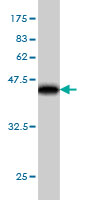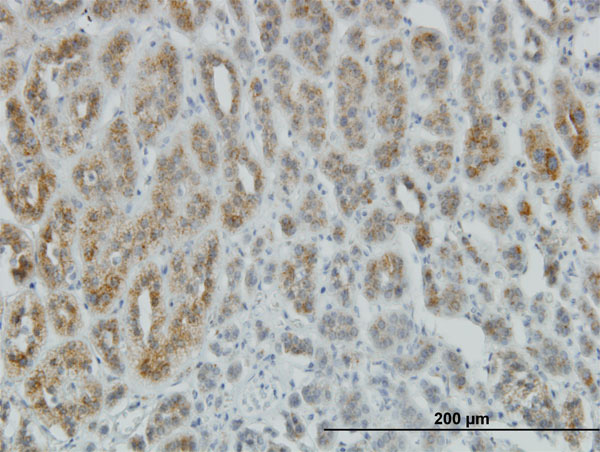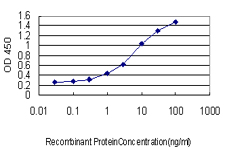AEBP1 Antibody (monoclonal) (M01)
Mouse monoclonal antibody raised against a partial recombinant AEBP1.
- 产品详情
- 实验流程
- 背景知识
Application
| WB, IHC, E |
|---|---|
| Primary Accession | Q8IUX7 |
| Other Accession | NM_001129 |
| Reactivity | Human |
| Host | mouse |
| Clonality | monoclonal |
| Isotype | IgG2a Kappa |
| Clone Names | 1D2 |
| Calculated MW | 130929 Da |
| Gene ID | 165 |
|---|---|
| Other Names | Adipocyte enhancer-binding protein 1, AE-binding protein 1, Aortic carboxypeptidase-like protein, AEBP1, ACLP |
| Target/Specificity | AEBP1 (NP_001120, 912 a.a. ~ 1013 a.a) partial recombinant protein with GST tag. MW of the GST tag alone is 26 KDa. |
| Dilution | WB~~1:500~1000 IHC~~1:100~500 E~~N/A |
| Format | Clear, colorless solution in phosphate buffered saline, pH 7.2 . |
| Storage | Store at -20°C or lower. Aliquot to avoid repeated freezing and thawing. |
| Precautions | AEBP1 Antibody (monoclonal) (M01) is for research use only and not for use in diagnostic or therapeutic procedures. |
For Research Use Only. Not For Use In Diagnostic Procedures.
Provided below are standard protocols that you may find useful for product applications.
BACKGROUND
The adipocyte enhancer binding protein 1 is a transcriptional repressor with carboxypeptidase (CP) activity. This protein binds to a regulatory sequence, adipocyte enhancer 1 (AE-1), located in the proximal promoter region of the adipose P2 (aP2) gene, which encodes the adipocyte fatty-acid binding protein. It is characterized as a member of the regulatory B-like CP family. This protein seems to be activated by a novel mechanism, whereby the direct binding of DNA enhances its protease activity. Adipocyte-enhancer binding protein 1 may play a role in differentiated vascular smooth muscle cells.
REFERENCES
PPARgamma1 and LXRalpha face a new regulator of macrophage cholesterol homeostasis and inflammatory responsiveness, AEBP1. Majdalawieh A, et al. Nucl Recept Signal, 2010 Apr 16. PMID 20419060.Aortic carboxypeptidase-like protein is expressed in fibrotic human lung and its absence protects against bleomycin-induced lung fibrosis. Schissel SL, et al. Am J Pathol, 2009 Mar. PMID 19179605.The role of AEBP1 in sex-specific diet-induced obesity. Zhang L, et al. Mol Med, 2005 Jan-Dec. PMID 16307171.Complete sequencing and characterization of 21,243 full-length human cDNAs. Ota T, et al. Nat Genet, 2004 Jan. PMID 14702039.Human chromosome 7: DNA sequence and biology. Scherer SW, et al. Science, 2003 May 2. PMID 12690205.
终于等到您。ABCEPTA(百远生物)抗体产品。
点击下方“我要评价 ”按钮提交您的反馈信息,您的反馈和评价是我们最宝贵的财富之一,
我们将在1-3个工作日内处理您的反馈信息。
如有疑问,联系:0512-88856768 tech-china@abcepta.com.























 癌症的基本特征包括细胞增殖、血管生成、迁移、凋亡逃避机制和细胞永生等。找到癌症发生过程中这些通路的关键标记物和对应的抗体用于检测至关重要。
癌症的基本特征包括细胞增殖、血管生成、迁移、凋亡逃避机制和细胞永生等。找到癌症发生过程中这些通路的关键标记物和对应的抗体用于检测至关重要。 为您推荐一个泛素化位点预测神器——泛素化分析工具,可以为您的蛋白的泛素化位点作出预测和评分。
为您推荐一个泛素化位点预测神器——泛素化分析工具,可以为您的蛋白的泛素化位点作出预测和评分。 细胞自噬受体图形绘图工具为你的蛋白的细胞受体结合位点作出预测和评分,识别结合到自噬通路中的蛋白是非常重要的,便于让我们理解自噬在正常生理、病理过程中的作用,如发育、细胞分化、神经退化性疾病、压力条件下、感染和癌症。
细胞自噬受体图形绘图工具为你的蛋白的细胞受体结合位点作出预测和评分,识别结合到自噬通路中的蛋白是非常重要的,便于让我们理解自噬在正常生理、病理过程中的作用,如发育、细胞分化、神经退化性疾病、压力条件下、感染和癌症。








